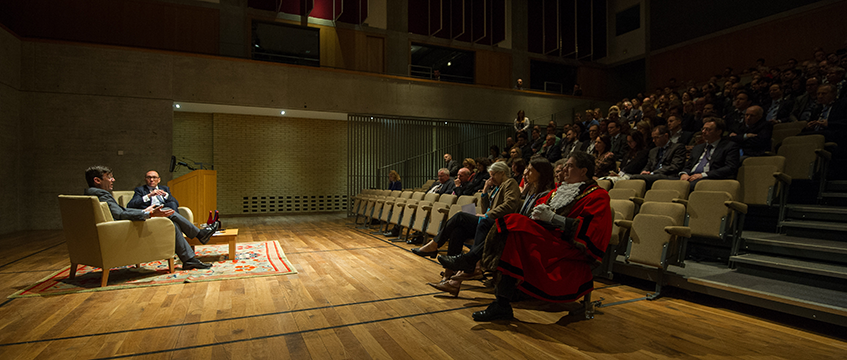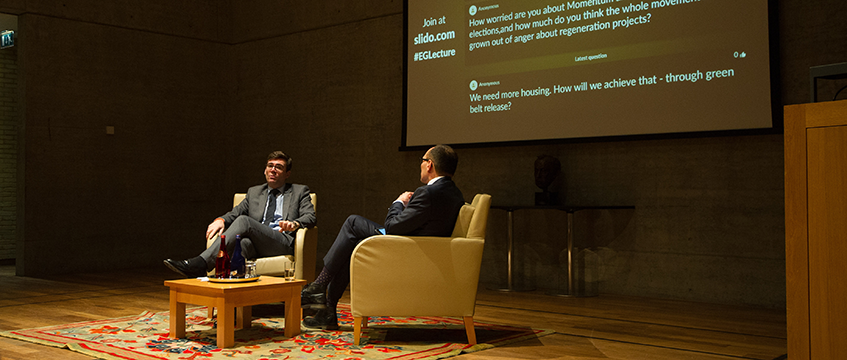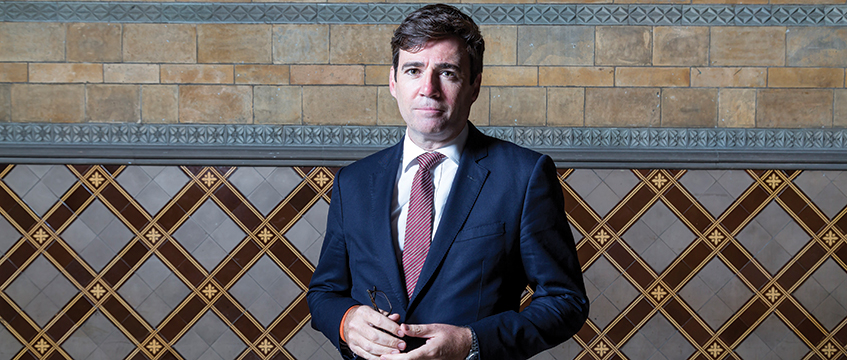Greater Manchester mayor Andy Burnham has called on the property industry to play a bigger role in delivering “inclusive growth” by regenerating underfunded town centres and supporting a new employment charter.
The mayor, who is overseeing the region’s spatial framework, has launched a town centre challenge to deliver an alternative approach to planning and development that moves away from what he has called the “developer-led, greenfield-first approach”.
“The property industry could think about all places, rather than just the most vibrant places,” he said at the EG Peter Wilson Lecture on 20 February, hosted by Fitzwilliam College, Cambridge and supported by Savills. “I’m looking for partners to regenerate some of the outlying towns in Greater Manchester, so we’ve just issued a town centre challenge.
Listen to the Peter Wilson lecture in full below
“I think we need the property industry to engage with that and help us put the pride back in those places. They are the places that perhaps did vote ‘leave’. They felt left behind. What we need to do is kind of create a sense that they are moving forward, that they are feeling the growth that is in the city centre.”
Submissions for Farnworth, Leigh, Prestwich, Stalybridge, Swinton, and Stretford to be part of the challenge have been made to the Greater Manchester Combined Authority. The initiative will be supported by Burnham’s powers to establish mayoral development corporations, the use of compulsory purchase orders and mayoral grants to kick-start developments.
Burnham has also called on the industry to support him in “challenging employment practices”. The combined authority is drawing up an employment charter that will give “good employers” a mayoral stamp if they achieve standards on issues such as security, fair pay, gender balance, a gender pay gap and flexibility for people who are carers. Employers who don’t meet those standards won’t receive contractual work from the combined authority, he says.
“We have allowed a culture of casualisation to creep into the workplace, particularly for the lowest third of the labour market, and I think it’s having quite devastating social implications,” Burnham said. “I think if the industry could get involved enthusiastically in that debate, that would be very welcome.”

COMMENT: Andy Burnham, mayor, Greater Manchester
If I think about life in this country, since I first came here [as a student at the University of Cambridge in the 1980s], in some ways it has changed for the better, but in many ways it hasn’t. We have a housing crisis, and record numbers of homeless people again.
I would say that the North-South divide has got bigger in those 30 years. I think life has certainly got harder for younger people, and I think more broadly, if you look at inequality (in the 1980s there was a big increase in inequality, which became much more of an issue after the relative stability of the 1960s and 70s), it’s stayed at the same level ever since.
And the modern world, I think, is adding an extra dimension to that. It’s not just inequality of income that is a real challenge in the times that we’re living in, it’s inequality of security. There are many people in Manchester whom I proudly represent who don’t know what they’re going to earn from one week to the next, because they have casual, zero-hours contracts, But they have the lethal combination of not just being in insecure work, they also live in insecure housing – private rented housing. They don’t know if they are going to be kicked out if they can’t pay the rent.
The failures of politics
And, for me, the world in many ways hasn’t got better, and politics hasn’t provided an answer to people in that position. It has made their lives worse. It has failed to regulate the property market adequately. It has failed to regulate the world of work adequately. It has failed to build enough homes that people need, and failed to deal with that housing crisis. It has failed to support young people. So I look at that and I wonder whether life has changed for the better since I was here.
Why are things like that? Why do I believe the Westminster system is broken?
I don’t think the EU referendum result was purely a reflection of people’s views about Europe or immigration. I think it was telling us something much deeper, and I felt this in my own constituency, a former industrial area. There’s a strong sentiment that I think has been brewing for many years in this country, and that is a sense that the country is run in the interests of some places and some people, and not for all places and all people. Some places have been neglected and left behind, and that sentiment found a very powerful expression at the 2016 referendum.
And why do I think that is the case? I think it’s because of the system that we live in. The political system that we have, I think, doesn’t represent all places and all people.
When you have an over-centralisation of power in one place, where within that over-centralised political system the London perspective on life predominates, and where the government is not sufficiently accountable to the public, it tells you how scandals like Hillsborough happened, how Carillion happened, how a large amount of the media ended up in the hands of one person, how a culture of sexual harassment emerges. Because you have an over-centralisation of power in one place, and that can breed a very unhealthy culture.
A London-centric system
How do we encourage the rebalancing of the country, more investment in infrastructure and the development of the property market? We have a real problem there, because the system is institutionally London-centric.
As chief secretary to the Treasury in 2007, the first task was to fund Crossrail, which I did, but I said to Treasury civil servants: don’t put all this money into London, surely there are some regional schemes that I can approve at the same time. I asked them to come up with a list and they came back with a list with literally nothing on it. And I asked, why? Surely there are projects out there that need to be funded? And when I got to the bottom of it, I discovered that the way the Treasury assesses spending, and the Department for Transport assesses transport projects, is all done by determining which projects will add most for GVA. As a result of that test, areas that have the strongest economy, which will always score highest when it comes to assessing what’s called BCR, will get support for their projects. So the country has been fueling the areas that are already doing great and abandoning areas that most need the support.
I think we need a whole new system of governance now. This country has got to wake up to where we are. We’ve got a huge challenge ahead of us. I’m not saying whether it’s going to be good or bad, but I do know this: we can’t waste any time. If I’m going to go around the world to bring overseas investors to Britain to put money into Greater Manchester, I’ve got to be investing in the skills of young people of Manchester and the transport systems to keep us moving.
Finding solutions
We can’t waste any time. The government needs to free us up to find solutions to these challenges. I predict confidently that in the next five to ten years, more social change for the better will come from the bottom up, from places like Greater Manchester, Cambridgeshire, the West Midlands, places with devolution. I can take inspiration from what’s happening in those places rather than taking direction from Westminster.
I think we’re on the cusp of that change, and I passionately believe in the 30-year journey that I’ve been on since I first stepped through the doors of this wonderful college. I passionately believe that the time has come to face up to the need for that change, to fundamentally alter our political system, bring it much closer to the people, and let them now face up to the future outside the European Union.
Andy Burnham’s five key priorities for more inclusive growth:
■ Elect the House of Lords so it is more representative and accountable.
■ Stimulate the regional economy by relocating the civil service.
■ Reform the party whip system so members of parliament have more freedom to vote on key issues in the way that they think is right.
■ Reduce the remit of parliament to key issues such as taxation, military and national security.
■ Maximise devolution, so parliament passes down responsibility to the regions to fund crucial services in a different way.

Q&A session with Andy Burnham
Are you concerned about being associated with the property industry following its implications in the Presidents’ Club scandal?
“Politicians can’t stand above other sectors and say, we’ve uniquely got it right and can preach to everybody else. I think everyone’s got to challenge prevailing cultures and see how they can be improved. What I do believe is that if you overcentralise power, in any organisation or system, you will in the end build an unhealthy culture, where those without the power are subject potentially to abuse – be that abuse in terms of employment contracts, or worse, sexual abuse.
It’s about challenging where power lies and empowering people right down your organisation, both to feel valued as employees, but also empowered to speak up when something is clearly wrong. And I, as a father of two teenage girls, feel kind of happy that this whole issue is finally being voiced loudly. I think the world’s going to change for the better as a result of it. It’s been the case for far too long that in industries where there’s been an overconcentration of money or power, women have stood to be the losers from that.”
What is the status of Greater Manchester’s discussions with government about a housing deal?
“I’m very positive about it. The fact that we’re being offered a housing deal is a good thing. I don’t mind if it’s a demanding deal, as long as central government gives us the funding and the flexibility to rise to the challenge. Many of the components of the deal speak to the agenda that I was advancing tonight, which is regenerating difficult brownfield sites and struggling town centres. I am hoping the deal, when it’s done, will give us that power. The deal is not yet concluded. We are hoping it will be in weeks, not months and I’m keeping my fingers crossed that it will help us deliver the commitments that the PM has promised about building more social housing.”
The property response: Rob Sadler, head of Savills’ Cambridge office
“In terms of regeneration of some of the cities, I think Andy Burnham’s words really do describe exactly what we should be doing in terms of utilising everything we’ve got to improve the rail network and the roads.
I’m not entirely in agreement that it shouldn’t be a developer-led process. I think it should be a combined process. There are some very good developers out there who take a long term-view in terms of creating a community, which we do need to do, rather than just building houses, so I think we need to get that combination right.”
To send feedback, e-mail Louisa.Clarence-Smith@egi.co.uk or tweet @LouisaClarence or @estatesgazette











